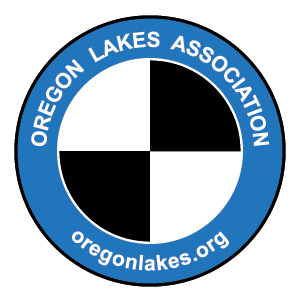| Oregon Lakes Association ....a voice for quiet waters. |
Fall 2020 Online Conference PresentationsSession 1: CyanoHABs: remote sensing and prediction (PDFs)Brian Fulfrost and Dan Sobota, Oregon DEQ. Monitoring and early detection of harmful algal blooms (HABs) in Oregon from space: a case study of successes, challenges and opportunities (PDF) James Watson and Mat Titus, The Prediction Lab, College of Earth, Ocean and Atmospheric Sciences, Oregon State University. Operational water quality forecasts using lots of small data and machine learning (PDF) Nick Tufillaro, College of Earth, Ocean and Atmospheric Sciences, Oregon State University. Looking at Oregon Lakes from Sentinel-2 (PDF not available) Amalia Handler, Jana Compton, Ryan Hill, Scott Leibowitz, US EPA. Remotely sensed cyanobacterial intensity predicts likelihood of lake blooms and toxins across the contiguous U.S. (PDF) Session 2: Conservation of Oregon Lakes (Zoom Meeting Recording)Andy Kerr, The Larch Company. Challenges and opportunities for conserving and protecting Oregon’s lakes. Lisa Brown, Staff Attorney, WaterWatch of Oregon. Oregon water law and lakes: potential tools for maintaining and restoring lakes. Marcelle Shoop, Director, Saline Lakes Program, National Audubon Society, Salt Lake City, Sustaining Great Basin saline lake ecosystems. Session 3: CyanoHABs, genetics and physiology (Zoom Meeting Recording)Tim Otten, Bend Genetics, 20 min, Public health monitoring of cyanobacteria: cost savings via Q-PCR and a tiered testing strategy. Lara Jansen, Portland State University, Ph.D. student and 2019 OLA Scholarship recipient. The potential roles of regional, catchment, and local scale factors on phytoplankton communities in montane lakes. Kevin Bladon, Associate Professor, Department of Forest Engineering, Resources, and Management, Oregon State University, Wildfire effects on water quantity, water quality, and aquatic ecology from forested headwaters to downstream reservoirs. Lindsay Collart, Department of Microbiology, Oregon State University, Ph.D. student and 2020 OLA Scholarship recipient. Proof of concept: Use of volatile organic compounds to predict toxic HAB trajectories at Upper Klamath Lake, OR. Conference Agenda |
